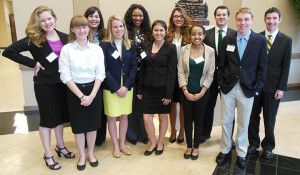

By Shannon Findley
Reporter
Late-night meetings, fiery debates and resolution writing are just a few of the demanding tasks required of the members of Baylor’s Model United Nations team. The class and club, which has been a part of Baylor since 1989, meets each Monday to focus on global issues.
Dr. Rebecca Flavin, lecturer of political science who teaches the Model UN course, said that Model UN is important because it informs students of issues outside of the United States.
“One of the things that Baylor’s Pro Futuris motto focuses on is informed engagement,” Flavin said.
She said students have to learn to communicate with new people, as well as how to develop and forge relationships. Students go beyond simply diagnosing problems, to thinking about ways to solve them.
“The most important part of this is the educational aspect,” Flavin said. “It forces students to think beyond what they are accustomed to. It’s transformational in the sense that they’re pushed outside of their comfort zones.”
Howard Payne University in Brownwood hosts a two-day Model UN conference every spring. At April’s invitational conference, Baylor students participated in a Historical Security Council and a Contemporary Security Council. The students represented Australia, the People’s Republic of China and the Republic of Korea in the Contemporary Security Council and the People’s Republic of China and Norway in the Historical Security Council.
“What they are trying to do at any Model UN conference is simulate the workings of the United Nations,” Flavin said.
Besides participating in the Howard Payne conference each spring, members of the class and club travel to two larger four to five day conferences each year, one in Chicago and one in New York. Baylor Model UN students, who have been selected through a round of tryouts, will represent Belize in the April 12 New York conference. Baylor’s Model UN team also hosts a high school conference for central Texas high schools every fall, and hopes to hold Baylor’s first collegiate Model UN conference next spring.
Atlanta junior Laura Beth Hooper, assistant head delegate of Model UN, said while in theory, Baylor’s Model UN team would consist of a lot of international studies majors, the team is actually made up of students of all different majors, such as business and political science. Being a part of Model UN helps students gain important skills that can be carried into almost any future career.
“Model UN plays a really big role in developing students’ professional skills,” Hooper said.
She said that Model UN simulations are very formal in nature, and teach the students involved a whole lot about teamwork and humility.
There are three main components to every Model UN conference – speaking, resolution writing and caucusing, or informal debate. At the Howard Payne conference, students spoke, wrote and debated about nuclear weapons in Iran as their contemporary topic, and the Vietnam War as their historical topic.
“This simulation was a little different because it was a crisis scenario,” Flavin said. “It required the students to do a lot of thinking on their feet. I was very impressed, especially by the fact that for a lot of them this was their first conference.”
Students of Model UN spent the entire semester leading up to the Howard Payne simulation studying country profiles, breaking into different governmental committees and presenting position papers to Howard Payne about what their countries’ stances would be on the different topics of the conference. Hooper said that position papers from every participating university were put on the Internet prior to the conference, so Baylor’s Model UN students had the opportunity to check out their competition.
All the hard work paid off as Baylor left the conference with top awards in every division. Newland, N.C. senior Rebekah Stryker and La Canada Flintridge, Calif. senior Ryan Gerlach, who represented the Republic of Korea, won best delegation and best policy memo in the Contemporary Security Council and Fairfield junior Caleb Gunnels and Houston freshman Eric Vining, who represented China, won best delegation and best policy memo in the Historical Security Council.
“One of the biggest unknown variables in any Model UN simulation is how well people are going to be in character for their country,” Hooper said. “I was just blown away with how people prepared for the conference. I saw so much growth, even from the first day to the second.”





